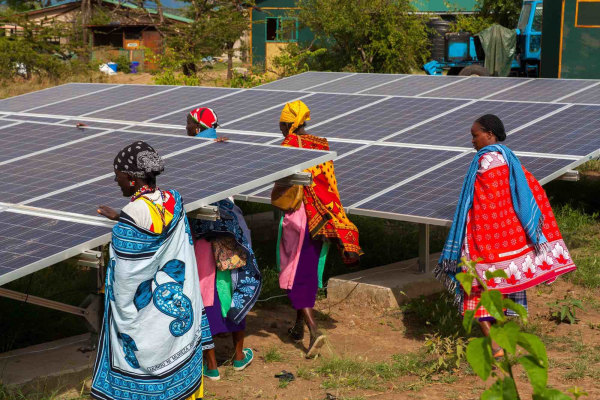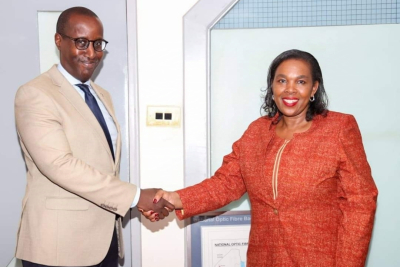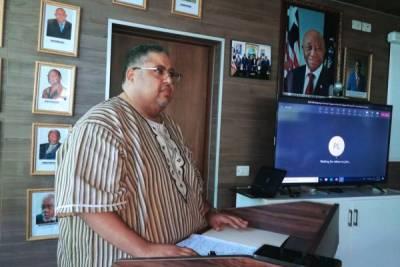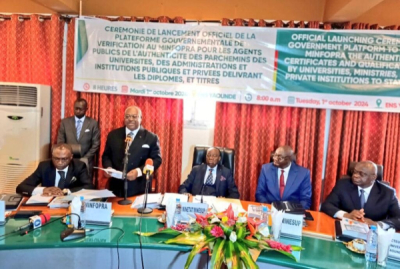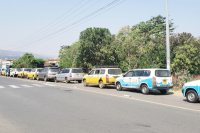
Tech (804)
This investment included, Equator’s inaugural fund has now reached $54 million. The company has already invested in six climate technology startups across the continent.
The International Finance Corporation (IFC) announced on Thursday, October 3, an investment of $5 million in Equator Fund Africa I, a venture capital fund supporting climate technology startups operating in sub-Saharan Africa. The goal is to help the African continent benefit from the sustainable solutions these startups are developing to combat climate change.
“Climate tech is an exciting area of innovation and impact in Africa, where businesses are helping economies grow while reducing emissions and resource use. IFC’s investment in Equator Africa reflects our commitment to supporting those businesses to deliver solutions, from renewable energy to electric vehicles,” said Farid Fezoua, IFC’s Global Director for Disruptive Technologies and Funds.
This investment comes at a time when the continent urgently needs funding to address the impacts of climate change. African start-ups in the climate tech sector are increasingly attracting financing. According to Africa: The Big Deal, these companies raised $340 million in 2019, $344 million in 2020, $613 million in 2021, $959 million in 2022, and $1.1 billion in 2023. In 2024, between January and May alone, climate tech start-ups attracted $325 million, representing 45% of the total funds raised by African start-ups during this period.
Climate change remains a significant challenge for the continent. According to Akinwumi Adesina, President of the African Development Bank (AfDB), “Africa will need $277 billion annually to address climate change, yet it currently only receives $30 billion per year.”
Adoni Conrad Quenum
Smartphone adoption remains relatively low in Uganda. According to the latest official statistics, the country has 16.7 million smartphones for 38.5 million active mobile subscribers.
The Uganda Communications Commission (UCC) has launched an initiative in partnership with the Federation of Small and Medium Enterprises (FSME) to equip owners of micro, small, and medium enterprises (MSMEs) with smartphones. The initiative aims to reach 2,720 beneficiaries by the end of the year, with a target of distributing 60,000 devices over three years.
“The government covers 50% of the cost of each phone, while the FSME covers the remaining balance. The sh50,000 contribution by recipients is to ensure a sense of ownership. We don’t want them to sell off the phones,” explained John Walugembe, Executive Director of FSME.
This initiative comes at a time when Ugandan MSMEs are struggling to access smartphones and lack digital skills, despite the fact that, according to Mr. Walugembe, “digital technology has the potential to transform businesses.” Smartphone adoption remains low across the general population. According to the latest UCC data, Uganda has 16.7 million smartphones for 38.5 million active mobile subscribers.
The program is expected to boost the productivity of MSMEs in Uganda. For example, Aisha Nalule, a hairdresser benefiting from the initiative, believes her smartphone will help her promote her services on platforms like Facebook, X, and TikTok.
t Uganda has 1.1 million MSMEs, according to data from the United Nations Conference on Trade and Development (UNCTAD). These businesses account for 80% of the country’s GDP and 90% of its private sector, according to the same source.
Isaac K. Kassouwi
E-commerce is flourishing in Africa, driven by its youthful, tech-savvy population and ongoing efforts to integrate economies across the continent.
In 2017, only 13% of Africans shopped online. However, according to a July 2024 report by cross-border payments company Nikulipe, this figure could soar to 40% by the end of 2025. This growth positions e-commerce as a key driver for strengthening intra-African trade.
Nikulipe's report, "Payments and E-commerce in Africa 2024," forecasts the African online commerce market to increase by $15 billion by 2028, representing a nearly 49% growth over four years. Data from Statista supports this trend, predicting an average annual growth rate of 11.7% between 2024 and 2028. This implies that the market size could double compared to 2023, when revenues stood at $16.1 billion.
Driving this expansion is a young, digitally connected population. With a median age of 19.7 years and over 1.4 billion people, Africa has significant demographic potential. Furthermore, internet usage has increased dramatically over the past decade, rising from 16% in 2013 to 37% in 2023, according to the International Telecommunication Union.
Despite this potential, intra-African e-commerce faces several challenges. According to a Trade Organization (WTO) report, inadequate infrastructure complicates cross-border trade. Additionally, the lack of harmonized e-commerce regulations between African countries adds to the complexity of cross-border transactions.
Toward Continental Trade Integration
Several initiatives are underway to facilitate intra-African trade. The African Continental Free Trade Area (AfCFTA) has introduced a digital trade protocol aimed at harmonizing regulations and simplifying online exchanges between African countries. Regional projects, such as the COMESA Digital Free Trade Area, also encourage e-commerce and digital integration among member states.
More African e-commerce players are expanding their reach across the continent. Jumia, a pan-African online retail company, operates in 11 countries and attracts 5.7 million active consumers worldwide. Anka Africa, based in Côte d'Ivoire, hosts over 20,000 online stores across 46 African countries, drawing more than one million visitors per month.
These platforms facilitate trade between African countries by providing a digital showcase for local producers and simplifying cross-border logistics.
Melchior Koba
As digital technology becomes essential in public service, many civil servants lack the necessary skills. This limits the government's ability to deliver efficient, tech-driven services. Addressing this skills gap will enhance productivity and service quality in sectors.
Kenya is set to launch a Centre of Excellence to train public servants in digital skills. Announced by the Ministry of Information, Communications & The Digital Economy on October 3, the center is hosted at the Kenya School of Government (KSG). It is part of a joint initiative with the United Nations Development Programme (UNDP).
The Centre will offer training in technology adoption and digital infrastructure to improve service delivery and promote job creation, officials said. Information, Communications, and the Digital Economy Cabinet Secretary, Margaret Ndung’u, met with UNDP and KSG officials to discuss the Centre’s governance and operational framework.
The project will incorporate a multi-sectoral approach for curriculum development and is expected to provide training to both local and international public sector professionals.
In an increasingly digital world, developing skills -particularly digital skills- is vital for economic growth and reducing unemployment, especially in emerging economies. In Kenya, this effort aligns with Vision 2030, which seeks to make the country industrialized and middle-income by 2030. The digitization of the civil service is an essential component of this vision. It aims to enhance the speed and efficiency of government services for users.
Hikmatu Bilali
The ongoing digital transformation in Africa is impacting all sectors, including public administration, which plays a central role in the daily lives of citizens. By integrating modern technologies, the goal is to enhance efficiency and reduce bureaucracy, making government services more accessible and streamlined.
Liberian Minister of Commerce and Industry, Amin Modad (photo), recently announced the imminent launch of new online services as part of a broader strategy to modernize administrative services.
During a statement on Thursday, October 3, at the Ministry of Information, Modad outlined several services set to be digitized, including the Liberian Business Registry, the issuance of online import and export permits, and the introduction of a new business registration certificate with anti-fraud security features. He highlighted that the business registration process, which previously took one to two weeks, has already been shortened to three to five days, with the aim of further reducing this timeframe through a digital platform designed to eliminate corruption and simplify procedures.
This initiative is part of a modernization strategy to tackle bureaucratic bottlenecks and corruption, long-standing issues that have hindered the business environment in Liberia. Minister Modad has also secured funding to fully digitize the ministry's services, marking a critical step in the country's digital transformation.
The launch of these new services is expected to bolster the government's efforts to digitize public administration, though Liberia continues to lag in this area. The country currently ranks 182nd in the UN's 2024 e-government report, down from 177th in 2022, reflecting a decline in modernization efforts.
The digitization strategy led by the Ministry of Commerce is set to improve administrative efficiency, increase revenue from business registrations and permits, reduce processing times, enhance transparency, and improve Liberia’s international competitiveness.
Samira Njoya
The issue of fake diplomas poses a significant challenge for Cameroon, as it does for many other countries. It undermines the integrity of the educational system and damages the credibility of institutions, as well as the local workforce.
On October 1, 2024, the Cameroonian government introduced a new digital platform aimed at verifying the authenticity of diplomas issued by universities, public administrations, and private institutions. The initiative was unveiled at the École Normale Supérieure (ENS) of the University of Yaoundé 1, during a ceremony co-chaired by the Minister of Higher Education (Minesup), Jacques Fame Ndongo, and the Minister of Public Service and Administrative Reform (Minfopra), Joseph Le.
The digital platform is described as an "essential tool" designed to streamline the often lengthy recruitment process within the public sector, which has been slowed by cumbersome diploma certification procedures. “This platform is not only a modern tool for verifying the authenticity of diplomas but also a guarantee of trust for citizens, employers, and especially public institutions,” said Joseph Le.
As per a joint circular from May 8, 2024, Minesup will provide Minfopra with a secure software interface, allowing access to diploma data. In return, Minfopra will be able to submit verification requests digitally, speeding up the process. A secure response confirming the authenticity of the diploma will then be sent back to Minfopra through the platform. According to Minister Le, the platform is “a crucial step” in the government's commitment to enhancing transparency and efficiency in public administration. The initiative is part of a broader modernization effort to improve the management of civil servant integration processes.
The platform aims to address the growing issue of fake diplomas in both the public and private sectors. For example, in June 2024, Defense Minister Joseph Beti Assomo announced the discovery of 1,312 fake diplomas during the recruitment process for young gendarmes and soldiers for the 2024 fiscal year. Similarly, in 2022, nearly 1,000 gendarmerie students were dismissed due to falsified credentials. This new platform is expected to help decrease such incidents by streamlining document verification.
The platform's launch follows an agreement signed between Minesup and Minfopra on April 6, 2023. It will be implemented in collaboration with the ministries that issue the most diplomas, including Minesup, the Ministry of Secondary Education (Minesec), the Ministry of Basic Education (Minedub), and the Ministry of Employment and Vocational Training (Minefop). Through this initiative, Minfopra aims to verify diploma authenticity more effectively and significantly reduce the processing times for recruitment and certification.
P.N.N.
For several months, Burundi has been grappling with an unprecedented fuel crisis. To address this situation, authorities are turning to digital solutions to optimize resource management at gas stations.
As part of efforts to improve fuel management, the Burundi Petroleum Company (Sopebu) recently announced the launch of a digital registration process for vehicles and machinery purchasing fuel at gas stations. This program, which began on September 30 and will run until October 7, aims to facilitate the registration of vehicle owners at designated registration sites in Bujumbura.
According to Sopebu, a mobile app called "Igitoro Pass V 1.0" has also been developed, allowing users to register remotely. The digital solution covers a wide range of vehicles, including buses, minibuses, trucks, dump trucks, administrative and diplomatic vehicles, tractors, private cars, tuk-tuks, motorcycles, and even generators.
This initiative is part of a broader strategy to modernize the sector, particularly critical amid a severe fuel shortage and frequent power outages that are impacting all aspects of daily life in Burundi. By digitizing the fuel sector, Sopebu aims to better regulate the amounts of fuel allocated to each type of vehicle. For example, a weekly quota of 80 liters of fuel is planned for small cars, with 40 liters per visit, while larger vehicles will be allocated 120 liters, or 60 liters per visit.
The digitization effort is also expected to improve stock management traceability, combat fraud more effectively, and optimize the fuel-related database management. By leveraging modern technologies, Sopebu aims to increase transparency and operational efficiency while ensuring fair fuel distribution for all users.
Samira Njoya
Egypt's data center market is seeing a surge in investment. On September 18, Prime Minister Moustafa Madbouli unveiled a green data center project, which will be developed in partnership with international investors.
Tech companies Intro Technology and Oman Data Park have signed a memorandum of understanding to build a data center in Egypt's Suez Canal Economic Zone. Valued at $450 million, the facility is expected to provide cloud solutions, Internet of Things (IoT) services, and drive digital transformation in both Egypt and the wider Middle East and North Africa (MENA) region.
“We look forward to working together to provide digital solutions through advanced data centers that meet the growing needs of companies worldwide to establish a presence in the region,” said Maqbool Al Wahaibi, CEO of Oman Data Park. The data center will offer over 80,000 square meters of operational space.
This partnership comes amid a surge in investments in Egypt's data center market. According to Arizton, the Egyptian data center market was valued at $182 million in 2023 and is projected to reach $513 million by 2029, representing a growth rate of 18.85% over this period.
“The Egypt data center market is on a notable upward trajectory, fueled by factors such as heightened digitalization, a surge in cloud service uptake, and the growing need for colocation services. A thriving IT landscape marks this industry, government efforts to bolster digital infrastructure, and Egypt's advantageous geographical position, making it an ideal hub for data center activities,” Arizton wrote in a market overview earlier this year.
Investments in data centers are expected to help address Egypt's data center capacity gap. Arizton forecasts that over 109 MW of capacity will be added across Egypt between 2024 and 2029. It’s worth noting that Africa as a whole requires 1,000 MW and 700 new facilities, according to Oxford Business Group’s “Data Centres in Africa Focus Report” published in April 2024.
Isaac K. Kassouwi
Start-ups, particularly those in technology, are key job creators. However, these startups are usually faced with financial hurdles. Providing essential capital to early-stage companies will help Africa tap into the innovation economy, fostering growth and resilience in the global tech landscape.
On October 1, a new $17.2 million (300 million rand) Seed Fund of Funds dedicated to technology start-ups was launched in South Africa. The fund, backed by the SA SME Fund, the Department of Science and Innovation, the Technology Innovation Agency (TIA), and E Squared Investments, aims to address a shortfall in early-stage capital for local start-ups.
Patrick Krappie, TIA’s acting CEO, stressed the government’s role in fostering innovation ecosystems. “The Seed Fund of Funds will catalyze a wave of new start-ups by enabling them to transition from ideas to viable enterprises,” Krappie said, adding that the fund would help place South Africa’s venture capital industry on sustainable footing.
The initiative aims to fund at least 50 technology-driven companies, focusing on innovation and transformation. Experienced fund managers will oversee the investments, ensuring that these start-ups have the resources to scale both locally and globally.
Ketso Gordhan, CEO of the SA SME Fund, highlighted the importance of seed funding, calling it the "cornerstone of entrepreneurial success" and the "lifeblood of innovation." He emphasized South Africa's wealth of brilliant minds and how the fund will help ensure more of them have the opportunity to succeed.
The launch of the fund is particularly timely as the country continues to grapple with high unemployment rates. As of Q2 2024, 8.4 million people (33.5%) remained unemployed, according to Statistics South Africa. This persistent challenge underscores the importance of fostering job creation, particularly in high-growth sectors like technology.
Start-ups have the potential to generate significant employment opportunities, particularly in innovative fields such as fintech, healthtech, and eCommerce, which are key drivers in South Africa's digital economy. With the new fund targeting at least 50 technology-driven companies, it can help reduce the country’s high jobless rate by empowering start-ups that contribute to both economic growth and job creation.
Hikmatu Bilali
The Mauritanian government is currently developing a roadmap to reform the education system, with digital technology playing a central role. The goal is to modernize teaching methods and integrate technological tools into schools, among other initiatives.
Mauritanian students will soon have access to digital textbooks, thanks to a new initiative by the National Pedagogical Institute (IPN). The reform will begin with the upcoming school year on October 7. The textbooks will be available for download through the "Koutoubi" (My Books) app, providing students with easier access to modern educational resources. According to IPN director Cheikh Ould Sidi Abdallah, the Koutoubi app complements the traditional distribution of paper textbooks, offering students and parents the option to acquire digital copies.
The initiative is part of a new National Textbook Strategy currently under development, which emphasizes the importance of digital technology. Its announcement comes amid broader efforts to enhance digitalization in schools. The Mauritanian government recently signed an agreement with the FIFA Foundation to train 10,000 schoolchildren, aged 6 to 12, in coding, robotics, and digital literacy over the next three years.
The introduction of digital textbooks is also expected to lighten the heavy school bags that are a common concern among parents. However, the success of this reform depends on schools' ability to provide the necessary equipment, such as tablets and computers, to ensure students can access these digital resources. The lack of such tools could hinder the full implementation of this ambitious project.
Despite these challenges, the transition to digital learning reflects a clear commitment to preparing Mauritania's younger generations for future technological challenges while improving access to modern educational materials.
Samira Njoya
More...
As Africa's digital economy expands, with industries like fintech, e-commerce, and agritech growing rapidly, cyberattacks pose a significant threat. A secure digital environment is essential for sustaining investor confidence, driving innovation, and enabling businesses to thrive.
SEACOM announced on October 1 a new partnership with US-based cybersecurity firm Arctic Wolf to enhance its cybersecurity services across Africa, addressing the growing threat landscape on the continent. With cyber-attacks increasingly targeting businesses of all sizes, this collaboration aims to provide SEACOM’s clients with advanced security operations solutions through Arctic Wolf’s cloud-native platform and expert security teams.
The partnership enables SEACOM clients to benefit from proactive and tailored protection against current and emerging threats. SEACOM emphasizes that Arctic Wolf’s platform will offer comprehensive visibility into customers' attack surfaces, allowing businesses to monitor their entire security environment from one central interface. This approach ensures rapid identification and response to malicious activities or vulnerabilities.
SEACOM’s portfolio will now include Arctic Wolf's suite of security solutions, such as Managed Detection and Response, Incident Response, and Cloud Security Posture Management.
Cybercrime is a growing threat in Africa, with ransomware attacks becoming more frequent. According to the ‘INTERPOL African Cyberthreat Assessment Report 2024,’ in early 2023, 1 in 15 African organizations experienced weekly ransomware attempts, much higher than the global average of 1 in 31. It adds that Kaspersky recorded over 300 attempts in South Africa in just one week. The financial impact of cybercrime in Africa is immense, with INTERPOL’s 2021 report estimating it at over $4 billion, or 10% of the region’s GDP. Additionally, cyberattacks on African organizations increased by 23% in 2023, marking the highest rate globally.
The growing threat particularly affects businesses and organizations lacking the resources to effectively monitor and respond to security incidents. This move highlights the need for advanced security strategies to safeguard operations in an increasingly digital world.
Hikmatu Bilali
She is determined to transform access to technology for artisans in Africa. Through her startup, she aims to simplify life for entrepreneurs in the informal sector.
Bams Betga (photo) is a Cameroonian artist and entrepreneur, co-founder, and CEO of African Puzzle Works, a company that specializes in creating software for artisans. Founded in 2021 by Betga and Renée Clément, African Puzzle Works is committed to innovation aimed at supporting entrepreneurs in the informal economy.
The company developed African Puzzle, a personal assistant designed specifically for entrepreneurs and project leaders. This mobile application, which utilizes audio and photo-based features, allows users to easily manage orders, client information, appointments, product catalogs, and track finances—without requiring literacy skills. "With our voice and image-based features, we remove the barriers to adopting technology for entrepreneurs with limited literacy. Everyone knows how to send a voice note or take a photo," explained Betga in 2024.
A former athlete, Bams Betga is also a singer-songwriter with four albums to her name. As the international partner of the World Business Angels Investment Forum in Cameroon, she is dedicated to improving access to financing for businesses. Additionally, she serves as the national representative for Cameroon’s startup ecosystem in the G100: Mission Million, a group of 100 women leaders worldwide.
In 2022, African Puzzle Works won first prize at the Blue Ocean Awards, which recognizes entrepreneurial innovation. More recently, in April 2024, Betga was nominated for Best Africa Solutions at the second edition of the Africa Solutions Week (SAS), held in France in September and scheduled to take place in Morocco from October 17 to 19, 2024.
Melchior Koba
The Comoros' digitalization project is expected to cost €22.53 million (approximately $25 million). The African Development Fund, the concessional lending arm of the African Development Bank (AfDB), has granted €4.02 million, while the Transition Support Facility has released €5.49 million.
The Board of Directors of the African Development Bank Group (AfDB) approved a €9.51 million ($10.5 million) funding package for the Comoros on Monday, September 30. These funds will support the implementation of the Comoros Economic Digitalization Support Project.
“The objective of the project is to promote the emergence of a comprehensive and coherent range of digital services that can meet the needs of the population, with the ultimate goal of aligning the country with the information society,” the institution said in a statement.
This initiative comes as digital transformation accelerates across the continent. According to the Measuring Digital Development – ICT Development Index 2024 report, published in July 2024 by the International Telecommunication Union (ITU), the Comoros ranks 25th in Africa with a score of 46.5 out of 100 on the ICT Development Index, below the African average of 50.3.
In terms of the E-Government Development Index (EGDI), the Comoros score significantly trails the African average of 0.4247, according to the E-Government Survey 2024: Accelerating Digital Transformation for Sustainable Development, published in September 2024 by the United Nations Department of Economic and Social Affairs (UN DESA). The country ranks 45th, with a score of 0.2586 out of 1.
The implementation of this project is expected to help the archipelago develop digital infrastructure, create a favorable regulatory and legal framework, enhance digital education and training, and promote technological innovation and entrepreneurship.
Adoni Conrad Quenum
Africa's fragmented regulatory landscape often poses significant challenges for entrepreneurs, who face different requirements in each country. Leveraging digital tools to lower entry barriers and provide a structured pathway for market expansion can boost economic transformation in Africa.
The UK, in collaboration with PwC, has introduced a digital toolkit through the UK-Kenya Tech Hub to aid entrepreneurs in accessing the Kenyan, Nigerian, and South African markets. The toolkit, launched on September 26, aims to streamline market entry and enhance opportunities for startups across various sectors, including agriculture, education, financial services, health, and manufacturing.
Jordan Kyongo, Head of the East Africa Research and Innovation Hub at the British High Commission in Nairobi, highlighted the importance of this initiative. "This toolkit will be an instrument in growing Africa’s entrepreneurial ecosystem by consolidating the requirements for market entry, ultimately easing the process for entrepreneurs," Kyongo stated.
The toolkit was developed to address the regulatory, certification, and tariff barriers that entrepreneurs often face when expanding into new markets. It includes practical tools, guides, and outputs designed to simplify the market entry process in the three targeted countries. Feedback from multiple validation sessions has helped refine the toolkit, making it a user-friendly resource for entrepreneurs navigating complex regulatory landscapes.
According to an article by AU Startups on ‘How African Tech Startups Can Navigate Regulatory Challenges,’ African startups face constant hurdles, including creating scalable solutions in unpredictable markets and securing funding in volatile economies. Additionally, complex and restrictive regulations in both their home markets and potential expansion areas further complicate operations, making compliance a crucial factor that can determine their success or failure. The toolkit aims to reduce the administrative burden by providing clear, consolidated information for market entry in Kenya, Nigeria, and South Africa. It also serves as a foundation for expanding similar initiatives into other African markets.
This digital toolkit could be a game-changer for African entrepreneurs, offering a model for overcoming market access challenges and promoting sustainable business growth.
Hikmatu Bilali


